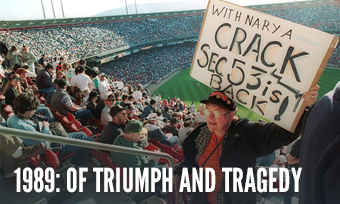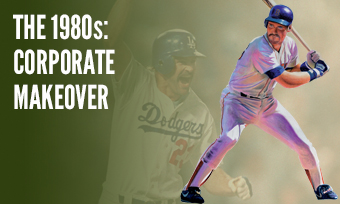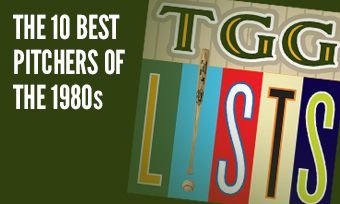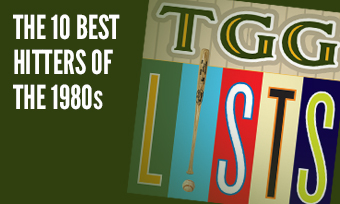The Yearly Reader
Leaders and Honors, 1989
Our list of baseball’s top 10 hitters and pitchers in both the American League and National League for the 1989 baseball season, as well as the awards and honors given to the game’s top achievers of the year.
The National League’s Top 10 Hitters, 1989
Bold type in brick red indicates league leader.
1. Kevin Mitchell, San Francisco
Key Numbers: .291 average, 100 runs, 34 doubles, 6 triples, 47 home runs, 125 RBIs, 87 walks, 32 intentional walks, .635 slugging percentage.
The Giants’ gain with Mitchell, who had a blowout season to earn MVP honors—was also the Padres’ gain, as a 1987 trade that sent him to San Francisco yielded 1989 NL Cy Young winner Mark Davis.
2. Will Clark, San Francisco
Key Numbers: .333 average, 104 runs, 198 hits, 38 doubles, 9 triples, 23 home runs, 111 RBIs.
In the emerging era of the synthetic superslugger, relative pencil-neck Clark posted some of the year’s most impressive numbers at the plate.
3. Howard Johnson, New York
Key Numbers: .287 average, 104 runs, 41 doubles, 36 home runs, 101 RBIs, 41 stolen bases.
HoJo to many, Johnson showed continued power to gradually prove that accusations of past corked bat usage were bunk.
4. Lonnie Smith, Atlanta
Key Numbers: 134 games, .315 average, 89 runs, 34 doubles, 21 home runs, 79 RBIs, 11 hit-by-pitches, 25 stolen bases, .415 on-base percentage.
Like Dave Parker before him, Smith completed the long road back to prominence after being sidetracked by drugs.
5. Pedro Guerrero, St. Louis
Key Numbers: .311 average, 177 hits, 42 doubles, 17 home runs, 117 RBIs, 12 sacrifice flies.
Guerrero played well enough at St. Louis to put behind the cry-aloud frustration of being traded to the Redbirds by Los Angeles a year earlier.
6. Ryne Sandberg, Chicago
Key Numbers: .290 average, 104 runs, 176 hits, 25 doubles, 5 triples, 30 home runs, 76 RBIs, 15 stolen bases.
Now the star veteran in a young and promising Cubs lineup, Sandberg helped lead Chicago to its second postseason appearance—and second winning record—in a 20-year stretch from 1973-92.
7. Eric Davis, Cincinnati
Key Numbers: 131 games, .281 average, 34 home runs, 101 RBIs, 21 stolen bases.
Davis’ cycle on June 2 against San Diego is the only one achieved by a Reds player since 1959.
8. Bobby Bonilla, Pittsburgh
Key Numbers: 163 games, .281 average, 96 runs, 173 hits, 37 doubles, 10 triples, 24 home runs, 86 RBIs.
Playing every game and then some, Bonilla thrived in an otherwise stalled Pirates offense (which hit .236 without him), and even began hitting well at Three Rivers Stadium after batting nearly 100 points below his road average there the previous two seasons.
9. Von Hayes, Philadelphia
Key Numbers: .259 average, 93 runs, 27 doubles, 26 home runs, 78 RBIs, 101 walks, 28 stolen bases.
Providing offensive glue in the Phillies’ transition from a retiring Mike Schmidt to emerging 1990s highlighters (John Kruk, Darren Daulton, etc.), Hayes flexed muscle and provided the National League with its only three-homer game of the year.
10. Jack Clark, San Diego
Key Numbers: .242 average, 26 home runs, 94 RBIs, 132 walks.
Prone to big games, Clark knocked in six runs on August 28—then brought home a career-high seven just one week later.
The American League’s Top 10 Hitters, 1989
1. Ruben Sierra, Texas
Key Numbers: 162 games, .306 average, 101 runs, 194 hits, 35 doubles, 14 triples, 29 home runs, 119 RBIs, .543 slugging percentage.
Despite a solid block of stats, Sierra’s MVP chances were diminished by critics who eagerly pointed out his shabby outfield defense (hence the sarcastic nickname, “Sie-error”).
2. Robin Yount, Milwaukee
Key Numbers: .318 average, 101 runs, 195 hits, 38 doubles, 9 triples, 21 home runs, 103 RBIs, 19 stolen bases.
Barely edging out Sierra, Yount became the only MVP winner to win it twice, one each at different positions.
3. Rickey Henderson, New York-Oakland
Key Numbers: .274 average, 113 runs, 26 doubles, 12 home runs, 57 RBIs, 126 walks, 77 stolen bases.
Sleepwalking in New York, Rickey roused to A-plus-list form with a trade to Oakland and proved you can go back home again.
4. Fred McGriff, Toronto
Key Numbers: .269 average, 98 runs, 27 doubles, 36 home runs, 92 RBIs, 119 walks.
McGriff’s ongoing improvement in Toronto was enough to chase competing first baseman Cecil Fielder into Japanese exile—for now.
5. Alvin Davis, Seattle
Key Numbers: .305 average, 84 runs, 30 doubles, 21 home runs, 95 RBIs, 101 walks.
As long as Mariners fans weren’t watching road games on TV, they must have thought the world of a revived Davis—who hit .365 at the Kingdome.
6. Wade Boggs, Boston
Key Numbers: .330 average, 113 runs, 205 hits, 51 doubles, 7 triples, 3 home runs, 54 RBIs, 107 walks, 19 intentional walks, .430 on-base percentage.
Though he didn’t grab a fifth straight AL batting crown, Boggs was impressive enough to earn his seventh straight (and last) batch of 200 hits, and his fourth consecutive year at 200-100 (200 hits, 100 walks).
7. Bo Jackson, Kansas City
Key Numbers: 135 games, .256 average, 86 runs, 15 doubles, 6 triples, 32 home runs, 105 RBIs, 172 strikeouts, 26 stolen bases.
Bo sure knew, alright; the two-sport star had his most productive campaign in the majors, and added a blistering home run in the All-Star Game at Anaheim called on NBC by President Ronald Reagan—making a cameo appearance alongside Vin Scully.
8. Kirby Puckett, Minnesota
Key Numbers: .339 average, 215 hits, 45 doubles, 9 home runs, 85 RBIs, 11 stolen bases.
Puckett was only the second right-handed American Leaguer to win a batting title in 20 years; on May 13 against Toronto, he became the only player in Twins/Senators history to smack four doubles in a game.
9. Don Mattingly, New York
Key Numbers: .303 average, 191 hits, 37 doubles, 23 home runs, 113 RBIs, 18 intentional walks.
Donnie Ballgame’s chronically bad back held together just long enough to give him one last fantastic year—and a good thing, too, for a Yankees team that otherwise lacked strong offensive spine.
10. Dwight Evans, Boston
Key Numbers: .285 average, 82 runs, 27 doubles, 20 home runs, 100 RBIs, 99 walks.
A strong finish to a strong decade for the underrated Evans, who placed third during the 1980s in runs and doubles, fourth in home runs and RBIs, and second in walks.
The National League’s Top 10 Pitchers, 1989
1. Orel Hershiser, Los Angeles
Key Numbers: 2.31 ERA, 15 wins, 15 losses, 33 starts, 4 shutouts, 256.2 innings, 91 walks, 29 grounded into double plays.
A superb follow-up to Hershiser’s excellent 1988 campaign was ruined when he went 0-7 in a nine-start stretch toward year’s end—all while lowering his season ERA. (The Dodgers scored a total of nine runs in those nine games.)
2. Jose DeLeon, St. Louis
Key Numbers: 3.05 ERA, 16 wins, 12 losses, 36 starts, 244.2 innings, 201 strikeouts.
The butt of jokes after a dreadful 2-19 mark for the 1985 Pirates, DeLeon completed the transition from punch line to prime time in St. Louis.
3. Bruce Hurst, San Diego
Key Numbers: 2.69 ERA, 15 wins, 11 losses, 33 starts, 10 complete games, 244.2 innings.
Signing a nice deal with the Padres after nine years in Boston, Hurst pitched at his best but realized he had to scratch and claw for wins with Wade Boggs, Dwight Evans and Co. no longer backing him up.
4. Scott Garrelts, San Francisco
Key Numbers: 2.28 ERA, 14 wins, 5 losses, .737 win percentage, 29 starts, 193.1 innings, 46 walks.
While the trend was for starters to be converted to closers, the eighth-year Giant did the opposite and grabbed an unexpected ERA title.
5. Mark Davis, San Diego
Key Numbers: 1.85 ERA, 4 wins, 3 losses, 44 saves, 4 blown saves, 70 appearances, 92.2 innings, 12 grounded into double plays.
Free agency couldn’t have come at a better time for Davis, who leveraged a Cy Young winning-performance to a fat contract with Kansas City—which yielded disastrous, injury-riddled results.
6. Ed Whitson, San Diego
Key Numbers: 2.66 ERA, 16 wins, 11 losses, 33 starts, 227 innings.
Finding peace, sunshine and tranquility in San Diego after a tumultuous tenure at Yankee Stadium lowlighted by punching out manager Billy Martin, Whitson ganged with Bruce Hurst to provide an effective one-two punch in the Padres’ rotation.
7. Greg Maddux, Chicago
Key Numbers: 2.95 ERA, 19 wins, 12 losses, 35 starts, 238.1 innings, 95 walks.
The baby-faced Maddux solidified his standing as the real deal with the Cubs, finishing one win shy of 20 for the first of five times in his Hall-of-Fame career.
8. Mike Morgan, Los Angeles
Key Numbers: 2.53 ERA, 8 wins, 11 losses, 1 blown save, 40 appearances, 19 starts, 152.2 innings, 33 walks.
The well-traveled (12 teams) pitcher took on his first NL assignment and sported a career-best ERA—which unfortunately matched the average run support per start given by his teammates.
9. Joe Magrane, St. Louis
Key Numbers: 2.91 ERA, 18 wins, 9 losses, 33 starts, 234.2 innings, 24 stolen bases allowed, 24 grounded into double plays.
The reigning NL ERA champ—and somehow doing it with a 5-9 record—received justified and overdue relief in the win column.
10. Mike Scott, Houston
Key Numbers: 3.10 ERA, 20 wins, 10 losses, 32 starts, 229 innings, 39 stolen bases allowed, 2 caught stealing/picked off.
Though not as dominant as he was back in 1986, Scott was still effective enough to win 20 games for the only time in his career and secured the most votes of any NL starter in the Cy Young Award vote.
The American League’s Top 10 Pitchers, 1989
1. Bret Saberhagen, Kansas City
Key Numbers: 2.16 ERA, 23 wins, 6 losses, .793 win percentage, 35 starts, 12 complete games, 262.1 innings, 43 walks.
If it’s an odd year, then it must be Saberhagen at his best—and he was never better in any year than 1989.
2. Mike Moore, Oakland
Key Numbers: 2.61 ERA, 19 wins, 11 losses, 35 starts, 241.2 innings, 17 wild pitches.
Signing on with Oakland after a career 66-96 record at lowly Seattle, Moore thrived on the opportunity to play for a winner.
3. Bert Blyleven, California
Key Numbers: 2.73 ERA, 17 wins, 5 losses, .773 win percentage, 33 starts, 5 shutouts, 241 innings, 44 walks, 25 grounded into double plays.
Following a dreadful 1988 campaign (5.43 ERA, AL-high 17 losses), Blyleven moved on to his sixth team and suffered the fewest defeats in any of his 22 full seasons.
4. Mark Gubicza, Kansas City
Key Numbers: 3.04 ERA, 15 wins, 11 losses, 36 starts, 255 innings.
One last workhorse showing from the sixth-year Royal, before shoulder issues derailed the bulk of his next eight years.
5. Dave Stewart, Oakland
Key Numbers: 3.32 ERA, 21 wins, 9 losses, .700 win percentage, 36 starts, 257.2 innings, 13 wild pitches.
The Oakland ace virtually mimeographed his 1988 numbers, except for one thing; after committing a major league-record 16 balks the year before, he was nailed for none in 1989.
6. Kevin Brown, Texas
Key Numbers: 3.35 ERA, 12 wins, 9 losses, 28 starts, 191 innings.
While Nolan Ryan was getting all the adulation in Arlington, Brown quietly emerged as the one Rangers starter that worried opponents more.
7. Jeff Russell, Texas
Key Numbers: 1.98 ERA, 6 wins, 4 losses, 38 saves, 6 blown saves, 71 appearances, 72.2 innings.
Following Dennis Eckersley’s cue, Russell converted from average starter to cagey closer.
8. Chris Bosio, Milwaukee
Key Numbers: 2.93 ERA, 15 wins, 10 losses, 32 starts, 212 innings, 32 grounded into double plays.
While the Brewers struggled to keep a flimsy rotation intact, Bosio provided the staples as the only guy tossing over 150 innings.
9. Kirk McCaskill, California
Key Numbers: 2.93 ERA, 15 wins, 10 losses, 32 starts, 212 innings, 32 grounded into double plays.
Though mate Bert Blyleven won the Comeback Player of the Year award, it could have easily been given to McCaskill, fighting back after two years bouncing on and off the DL.
10. Roger Clemens, Boston
Key Numbers: 3.13 ERA, 17 wins, 11 losses, 35 starts, 253.1 innings, 19 stolen bases allowed, 17 caught stealing/picked off, 23 grounded into double plays.
The Rocket was blasted for 20 home runs—but only three of them came with men on base.









